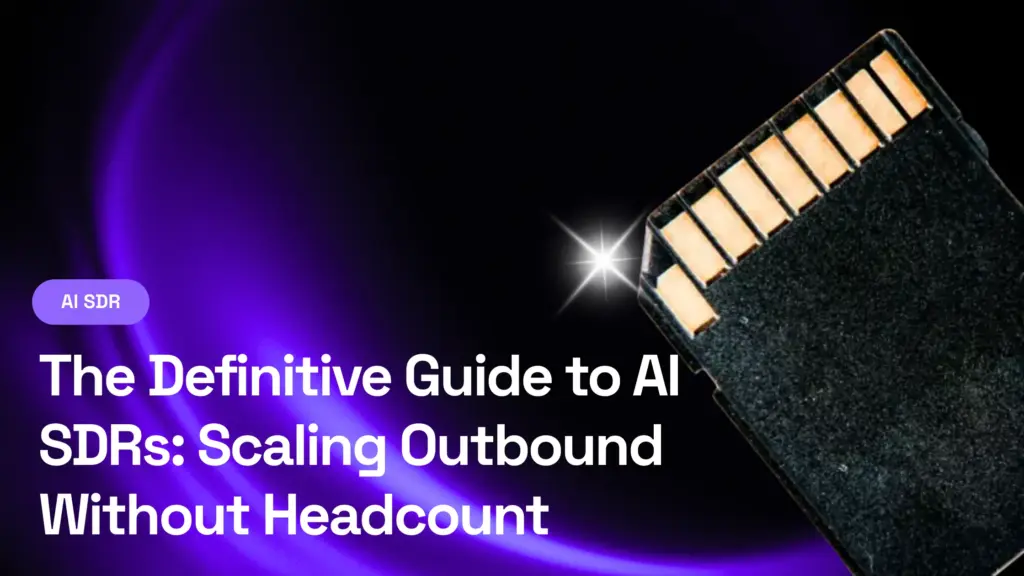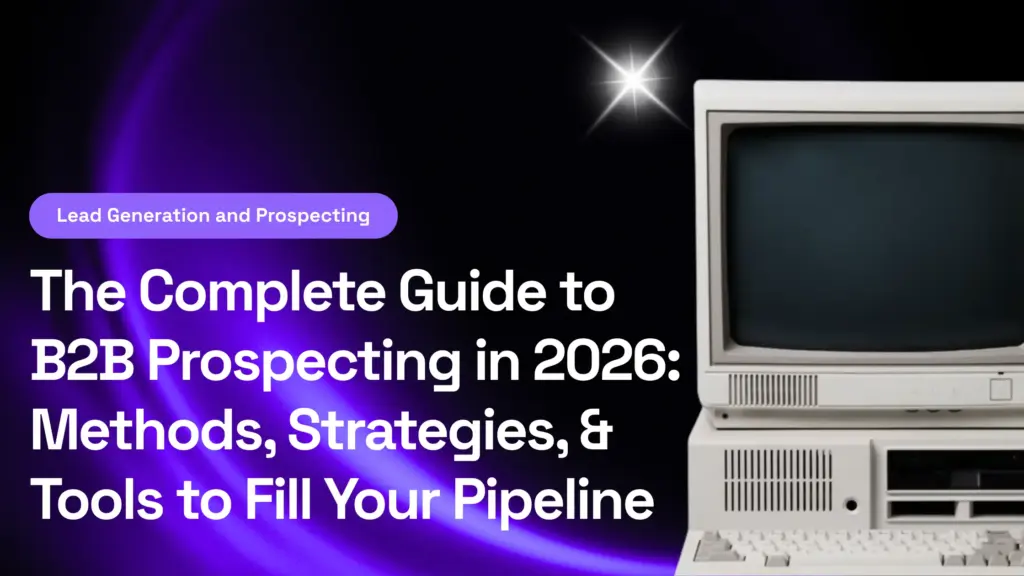Sales teams are continuously looking for ways to maximize their success rates and streamline their procedures. Predictive Lead Scoring is one instrument that has lately become revolutionary. Using advanced analytics and machine learning, this creative technique transforms how companies find and rank possible clients.
Beyond conventional lead-scoring approaches, predictive lead-scoring is a complex strategy. It forecasts which leads are most likely to become customers using historical data, behavioral trends, and sophisticated algorithms. This predictive algorithm can effectively evaluate the possible worth of every lead by means of extensive data point analysis, therefore enabling sales teams to concentrate their efforts where most likely to produce results.
Early on in the sales process, teams can:
1. More effectively distribute resources
2. Tailor their outreach plans.
3. Cut the time lost on inferior leads.
4. Raise general conversion rates.
5. More tightly coordinated marketing and sales initiatives.
Deeper into the realm of Predictive Lead Scoring, we will investigate its main elements, differences from conventional approaches, and the technology driving it. We will also go over implementation techniques, typical difficulties, and how innovative platforms like Anybiz.io are enabling companies of all kinds to have this potent weapon at hand.
What is Predictive Lead Scoring?
Predictive lead scoring is an advanced method of evaluating and ranking potential customers (leads) based on their likelihood to convert into actual customers. This data-driven method forecasts the leads most likely to produce effective sales outcomes using historical data, machine learning algorithms, and statistical models.
Predictive lead scoring is really about using data to guide decisions. It combines a broad spectrum of behavioral and contextual elements going beyond basic demographic or firmographic information. The aim is to build a dynamic, self-improving system able to precisely forecast lead quality and possible value to the company.
Key components of predictive lead scoring
👉 Predictive lead scoring rests on data collecting. It entails compiling pertinent data from several sources—including CRM systems, internet interactions, email responses, social media activity, and outside data suppliers. This thorough data collecting guarantees every lead a whole picture.
👉 Predictive lead scoring is essentially based on machine learning techniques. Using past data, these advanced artificial intelligence programs examine trends and connections. By learning from past successes and mistakes, they constantly enhance future forecasts, hence increasing the accuracy of the scoring system across time.
👉 A key element that creates a mathematical framework to provide weights to several elements depending on their predicting ability is the scoring model. This model generates a score for every lead, usually on a range (e.g., 0-100), therefore reflecting their conversion probability.
👉 Predictive lead scoring has as its main characteristic dynamic adaptation. To keep accuracy across time, the system constantly changes the model depending on fresh data and results. This guarantees that the scoring stays pertinent even if consumer behavior or market conditions evolve.
👉 Predictive lead scoring cannot be practically applied without integration with marketing and sales technologies. The technology easily accesses and uses predicted scores included into current CRM and marketing automation systems to enable sales teams.
👉 Actionable insights transcend simple scores. Predictive lead scoring helps organizations understand why a prospect is scored highly and how best to approach them, therefore offering explanations and recommendations to direct sales efforts.
👉 The foundation of predictive lead scoring is multi-factor analysis. The system takes demographic data, corporate information, internet behavior, engagement history, and market trends into account among other factors. This thorough investigation offers a sophisticated knowledge of every lead’s possible value.
👉 Still another great feature of predictive lead scoring is real-time scoring. As fresh data becomes available, the system instantly changes lead ratings to enable quick and pertinent outreach. This guarantees that sales teams have always access to the most current data.
Using these elements, predictive lead scoring turns unprocessable data into useful insight. It helps sales teams to concentrate their efforts on the most interesting leads, adapt their strategy depending on lead qualities, and finally raise their conversion rates and general sales effectiveness.
Predictive vs. Traditional Lead Scoring
Overview of traditional lead scoring methods
For decades sales and marketing teams have used traditional lead scoring as their approach. Usually, it entails giving different lead traits and actions point values depending on their apparent relevance. These could be demographic data (like job title or company size), firmographic data (industry type or annual revenue), and engagement measurements (website visits, email openings, or content downloads).
Under a conventional paradigm, sales teams and marketing teams jointly choose which elements are most critical and give point values accordingly. A C-level executive might be worth twenty points, for instance, whereas a manager-level lead might only be worth ten. Likewise, opening an email can be worth five points but downloading a whitepaper could be worth fifteen points.
These scores are then totaled to provide every lead an overall score. Considered “sales-ready,” leads that meet a specific threshold are forwarded to the sales staff for follow-up.
How predictive lead scoring differs
Predictive lead scoring approaches things somewhat differently. It employs machine learning algorithms to examine past data and find trends that match successful conversions, therefore substituting for human-defined rules and point values.
The predictive model takes into account a far wider spectrum of data points including subtle behavioral signals and outside variables that might not be clear to human observers. Constantly changing its criteria depending on fresh data, it may identify intricate correlations between variables and weigh them accordingly.
Predictive lead scoring presents a dynamic, real-time assessment of a lead’s likelihood to convert, unlike conventional scoring, which usually yields a fixed score. As fresh data becomes available, this score is always changing to offer a more accurate and immediate assessment of the possible value of every lead.
Advantages of predictive over traditional methods:
- Accuracy. Predictive models can process vast amounts of data and detect subtle patterns that humans might miss, leading to more accurate lead scoring.
- Objectivity. By relying on data rather than human intuition, predictive scoring removes potential biases and inconsistencies inherent in traditional methods.
- Adaptability. Predictive models automatically adjust to changing market conditions and evolving customer behaviors, maintaining their accuracy over time without manual intervention.
- Scalability. Once set up, predictive models can handle large volumes of leads without additional effort, making them ideal for growing businesses.
- Nuanced insights. Predictive scoring can reveal unexpected indicators of lead quality, providing valuable insights for refining marketing and sales strategies.
- Time efficiency. By automating the scoring process and prioritizing leads more accurately, predictive scoring saves valuable time for sales teams.
- Personalization. The detailed insights from predictive scoring enable more personalized and effective outreach strategies.
ROI improvement. By focusing efforts on the most promising leads, predictive scoring typically leads to higher conversion rates and better return on investment.
The Predictive Lead Scoring Technology
Modern technology is what provides precise and useful insights for predictive lead scoring. Fundamentally, this technology blends three important components:
1. Predictive lead scoring’s foundation is artificial intelligence and machine learning techniques. These advanced technologies examine past data to find trends and connections suggesting a lead’s probability to convert. As they process more data and results, machine learning models keep becoming more accurate over time.
2. Predictive lead scoring made possible by big data analytics lets one manage enormous volumes of data from many sources. This covers consumer contacts, demographic data, firmographic information, and behavioral trends.
3. Predictive lead scoring cannot be practically applied without integration with CRM systems. Predictive models may access real-time data and generate current scores straight within the tools sales people use daily by smoothly interacting with current customer relationship management systems.
These technologies used together constitute a strong system that converts unprocessed data into relevant forecasts, enabling sales teams to concentrate their attention on the most interesting leads and maximize their whole sales strategy.
How Predictive Lead Scoring Boosts Sales Success
Improved lead qualification accuracy
Using sophisticated algorithms to examine a broad spectrum of elements, predictive lead scoring produces a more exact identification of high-potential leads. The technology can find latent signals of sales readiness that human analysts might overlook by weighing explicit and implicit data points.
Efficient resource allocation
More precisely knowing lead quality helps sales teams better deploy their time and resources. While lower-scoring leads might be developed by automated marketing initiatives, high-scoring prospects get quick attention and tailored approach.
Increased conversion rates
Sales teams naturally observe a rise in conversion rates by giving top-notch leads first priority. Their strategy can be customized depending on the particular traits and actions the predictive model has found as markers of sales readiness.
Shortened sales cycles
In numerous respects, predictive lead scoring speeds up the sales process. Sales teams can engage high-potential leads early in their purchase process by fast spotting them.
Predictive lead scoring uses these systems to convert the sales process from a numbers game into a strategic, data-driven method. It helps sales teams to work smarter rather than harder, so improving productivity, raising conversion rates, and eventually increasing sales success.
Read also – Top 15 B2B Leads Databases: All you need to know [UPDATED]
AnyBiz and Predictive Lead Scoring: AI-Driven Lead Evaluation

AnyBiz revolutionizes the lead evaluation process through its advanced AI-driven predictive lead scoring system. Unlike traditional methods that rely on manual scoring or simple rule-based systems, AnyBiz leverages artificial intelligence to automatically identify, evaluate, and prioritize leads with unprecedented accuracy and efficiency.
Lead Selection and Evaluation Process
✅ At the heart of AnyBiz’s lead evaluation process is its sophisticated data collection system. AnyBiz’s AI agents continuously gather data from various sources, including a vast database of over 80 million prospects, website interactions, email engagements, and social media activities. This comprehensive data collection forms the foundation for accurate lead scoring.
✅ Once the data is collected, AnyBiz employs a multi-factor analysis approach. The system analyzes over 10,000 data points per hour, considering factors such as prospect behavior, company information, engagement history, and market trends. This in-depth analysis allows for a nuanced understanding of each potential lead.
✅ Using machine learning algorithms, AnyBiz creates and refines predictive models that identify patterns indicative of high-quality leads. These models are the core of the predictive lead scoring system, constantly learning and adapting to new data and outcomes.
✅ Based on these sophisticated models, each lead is automatically assigned a score reflecting their likelihood to convert. This automated scoring process ensures objectivity and consistency in lead evaluation, something that’s often challenging to achieve with manual methods.
✅ AnyBiz doesn’t stop at initial scoring. The system employs dynamic reassessment, continuously updating scores in real-time as new data becomes available. This ensures the most current and accurate lead evaluation, allowing sales teams to always focus on the most promising prospects.
✅ Finally, based on the scoring, AnyBiz’s AI agents craft personalized, multi-channel outreach strategies for each prospect. This personalized engagement maximizes the chances of converting high-quality leads into customers.
Through this comprehensive, AI-driven process, AnyBiz transforms lead evaluation from a time-consuming, often subjective task into a precise, efficient, and highly effective operation. By automating and optimizing each step of the lead evaluation process, AnyBiz empowers businesses to focus their resources on the most promising opportunities, ultimately driving sales success and business growth.
AnyBiz’s approach to lead evaluation represents a significant advancement in predictive lead scoring. By harnessing the power of AI and big data analytics, it provides a more nuanced, accurate, and dynamic method of identifying and prioritizing leads, giving businesses a competitive edge in their sales and marketing efforts.
How Anybiz.io addresses common challenges
Anybiz.io effectively tackles several common sales challenges through its innovative AI-driven approach. By automating lead scoring and qualification, it eliminates the need for manual processes, significantly reducing time wasted on low-quality leads.
This automation allows sales teams to focus their efforts on high-potential prospects, thereby improving overall ROI.
The platform’s continuous, personalized engagement accelerates the sales cycle, moving leads through the funnel more efficiently. Anybiz.io also addresses email deliverability concerns with its built-in domain warming feature, ensuring that outreach efforts reach their intended targets.
Additionally, the platform enhances brand awareness through automated social media interactions, expanding the company’s digital footprint without additional manual effort.
Getting Started with Anybiz.io
- Connect LinkedIn – link your account and verify your website.
- Confirm Your Position – review and adjust your job title as needed.
- Review Business Description – validate automatically generated descriptions of your offer, product, and business solutions.
- Choose Potential Customers – select from a provided list of current customers.
- Define Target Prospect – specify the job title of your ideal prospect.
- Add Calendly Link (Optional) – include for easy meeting scheduling.
After these steps, Anybiz.io handles the technical setup:
- Purchases a domain for your outreach campaigns
- Creates and sets up mailboxes
- Warms up your new email domain to improve deliverability
Sign up now for a 7-day free trial with full access to all features. Revolutionize your sales process and accelerate your business growth – no strings attached!
Conclusion
Using predictive lead scoring has clearly and significantly advantages. From better lead qualifying accuracy and effective resource allocation to higher conversion rates and reduced sales cycles, this technology has the ability to completely change your sales process and propel significant corporate expansion.
But the real value of predictive lead scoring comes from how it helps companies interact with promising leads in a more timely and customized way, not only from its capacity to spot them. Companies can create customized outreach plans that appeal to possible consumers by using AI-driven information, hence improving conversion rates and customer happiness.
Platforms like Anybiz.io help to illustrate predictive lead scoring, which marks a paradigm change in how companies handle lead generation and sales.
📜 Related articles:



